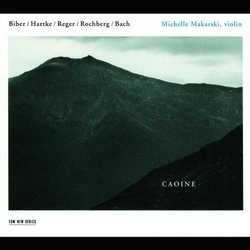| All Artists: Heinrich Ignaz Biber Title: Caoine: Music by Biber, Hartke, Reger, Rochberg, Bach / Makarski Members Wishing: 1 Total Copies: 0 Label: Ecm Import Release Date: 4/18/2000 Album Type: Original recording reissued, Import Genre: Classical Styles: Chamber Music, Historical Periods, Baroque (c.1600-1750), Classical (c.1770-1830), Modern, 20th, & 21st Century, Instruments, Strings Number of Discs: 1 SwapaCD Credits: 1 UPCs: 028944995725, 0028944995725 |
Search - Heinrich Ignaz Biber :: Caoine: Music by Biber, Hartke, Reger, Rochberg, Bach / Makarski
 | Heinrich Ignaz Biber Caoine: Music by Biber, Hartke, Reger, Rochberg, Bach / Makarski Genre: Classical
Performing unaccompanied violin music requires dauntless courage as well as technical skill, expressive involvement, and stylistic empathy. This record stands out both for the high quality of the playing and the imaginativ... more » |
Larger Image |
CD Details
Synopsis
Amazon.com
Performing unaccompanied violin music requires dauntless courage as well as technical skill, expressive involvement, and stylistic empathy. This record stands out both for the high quality of the playing and the imaginative, adventurous program, which frames contemporary music with two baroque works; its focus on variations creates unity within diversity. The title derives from Stephen Hartke's Caoine, a Celtic word meaning "wail"; inspired by traditional Irish fiddling and the keening of mourning women, its lamenting rhetoric and passionate climaxes are movingly evoked in an expressive performance. Paganini's famous 24th Caprice, itself a notoriously difficult set of variations, has inspired numerous composers to produce their own; George Rochberg's 51 Caprice Variations, of which 11 are included here, are wildly inventive, transforming the theme, which is stated only at the end, beyond all recognition. Their technical hurdles are more formidable than Paganini's own; Makarski surmounts them with ease and elegance. Max Reger's austere, monumental Chaconne is frankly modeled on Bach's, whose sonatas and partitas stand supreme in this literature. In his B-minor Partita and Biber's stately Passacaglia, Makarski solves the problem of playing baroque music on a modern instrument by using "period" articulation and sparing vibrato, producing a wonderfully pure sound with restrained dynamic contrasts and intense but inward expressiveness. Her recent recordings give further proof of her versatility: Just check out From the Green Hill, on which she improvises solos with Tomasz Stanko's jazz group. --Edith Eisler

 Track Listings (18) - Disc #1
Track Listings (18) - Disc #1